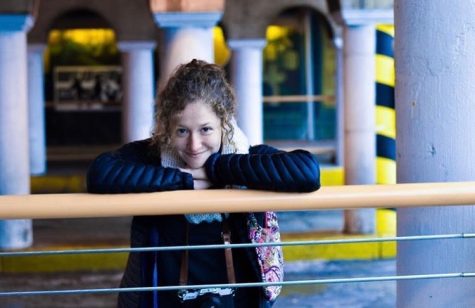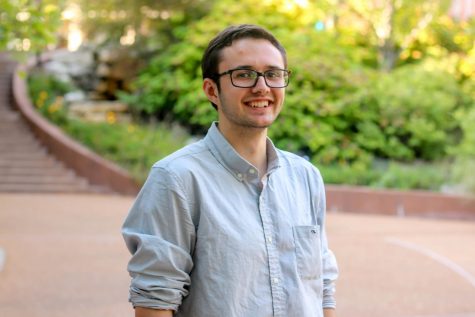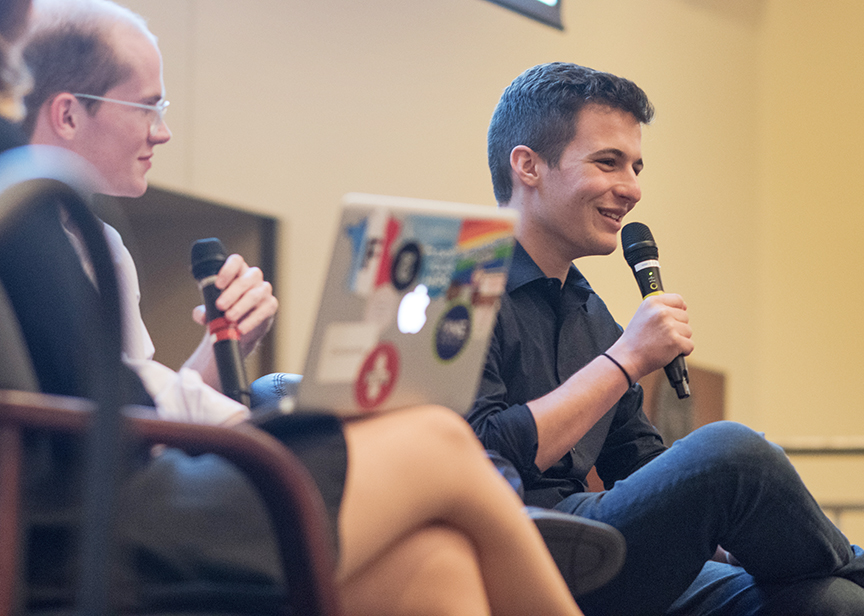Reluctant Hero: Cameron Kasky Visits SLU
High school student Cameron Kasky is no stranger to the limelight. The Parkland, Florida firebrand gained national attention in February 2018 after he said enough was enough following the deadliest high school shooting in the U.S., surpassing the Columbine High School massacre in 1999.
Proliferated with media attention since the shooting, Marjory Stoneman Douglas High School has since become a trademark to instill a stricter gun control policy – that of which came to fruition on March 24, 2018, when March for Our Lives was held in major cities nationwide. Kasky, co-founder of the movement, not only spoke to SLU students about the shooting and motive behind the march, but he also addressed the country’s polarization on gun control. The talk was held at the Wool Ballrooms on Nov. 7 at 7 p.m.
“I grew up addicted to political media,” he said. “I consumed it like candy. I wanted to go out there and have people think of Parkland not as the city where everyone was crying, but as the city where something different needs to happen.”
Kasky said he knew the media would exploit Parkland, his childhood town that was tainted by one incident, just like it did with the Sandy Hook and Aurora shootings. He mentioned that the media expected to see crying; it expected to see people’s infuriation. Kasky realized that the once “safe” image of Parkland was outdated – but he used this as a backbone to reinvent its destined image.
“I see the media giving people like me a victim of status,” he said. “It looks at the Parkland shooting like a car accident – everyone is so emotional, so they will say, ‘Look at these graphic stories of blood and gore,’ instead of discussing solutions […] So much of it is politically driven.”
Kasky turned the attention his high school was getting on its head.
With the media still covering various aspects of the shooting, whether it be looking more into Nikolas Cruz’s past or its emotional toll on the students, Kasky spearheaded a march to write a different narrative.
“Two days after the shooting, I was in my bathroom, wearing my Ghostbusters pajamas and had just finished freshening up for the evening,” he said. “I gathered some of my closest friends at my home and said that we were going to march in D.C. They said that it was a horrible idea – but they played along – and we did a march in D.C. I thought, ‘Let’s go to D.C., so politicians can’t run away to home.’”
Sleeping approximately nine hours during the first week of planning, Kasky and his friends connected with people in D.C., complained at City Hall and dealt with permits, as they all were under the age of 18. “It all happened in a tremendously fast hurricane, but we ended up getting a couple people to show up,” he said. A “couple” became over 200,000 participants in the D.C. March for Our Lives demonstration.
Kasky originally saw March for Our Lives as a movement to keep kids safe in school, not a political statement. Kasky said that most people care about kids getting shot at school, and just because there are disagreements about how to keep them safe doesn’t mean that the opposing side is inherently wrong.
“That’s the problem with our country: We are not looking at each other as fellow citizens,” he said. “We are not looking at each other to find some sort of understanding. We need to stop assuming that if we voted for someone who they didn’t vote for, that this person is wrong or inherently racist.”
Kasky’s talk came at a pivotal time, as the midterm elections were the day before his visit to SLU. He discussed his distaste with Florida Governor Ronald DeSantis, but Kasky also had a problem with people saying that if you did not vote for Andrew Gillum, you lacked morals. “We are instantly inclined to think that [your decision to vote for DeSantis] is based on your character, instead of logic and argument.”
Rather, Kasky argued, you need to assess the points that politicians are making before you formulate a judgement. If you truly believe in what you advocate for, you will talk to someone from the opposite side with the goal of understanding and, perhaps, finding compromise.
This is Kasky’s goal. He does not want to change people’s opinions on how to prevent school shootings. “I think 98 percent of people care if kids get shot. There’s that 2 percent that we can’t really do anything about, but most people care.”
Your donation will support the student journalists of Saint Louis University.

Staunch entered SLU as a Biomedical Engineering major on a Pre-med track, with the intention of continuing her studies in medical school. After a year and a half at SLU, she realized she missed the balance of the arts with sciences as she was previously an editor in her high school yearbook committee.
"Working for UNews, whether it was as Associate News Editor, Managing Editor, or Editor-in-Chief, has taught me the value of working on tight deadlines and how to adequately adapt to certain unexpected situations. The field of Journalism is incredibly fast paced - but that is why I love it so much," Staunch said. "There is always something new occurring, and you would not be able to effectively complete your job unless you had the support of your other editors and staff."
Though paradoxical in nature, she switched her major to Communication. She wants to incorporate both her analytical and creative sides to report on medical topics. Her dream job: to write for Discover Magazine.
When Staunch is not in the newsroom, she is captaining the women’s Ultimate Frisbee team at SLU. She began playing her freshman year and enjoys it as an outlet.





